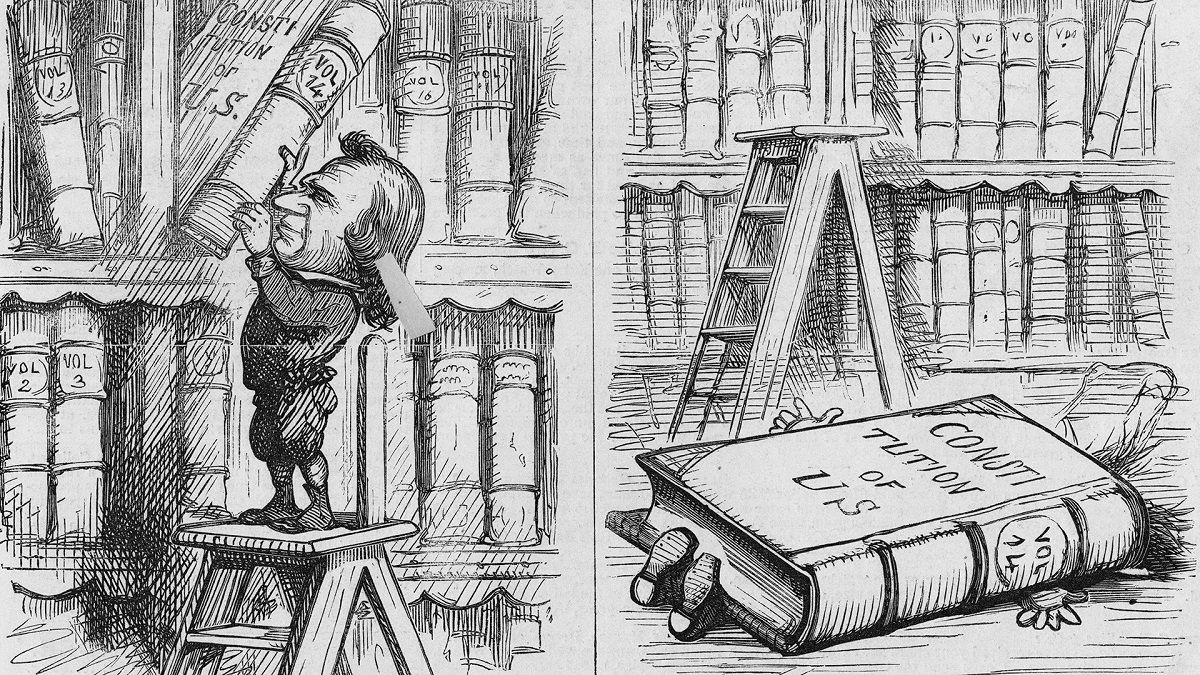
Andrew Johnson's Failed Presidency Echoes in Trump's White House
- Select a language for the TTS:
- UK English Female
- UK English Male
- US English Female
- US English Male
- Australian Female
- Australian Male
- Language selected: (auto detect) - EN
Play all audios:
This article about Andrew Johnson is republished here with permission from The Conversation. This content is shared here because the topic may interest Snopes readers; it does not, however,
represent the work of Snopes fact-checkers or editors.
Who’s the most vulgar, racist, thin-skinned, vituperative U.S. president?
As a historian of Reconstruction, I’ve always believed that it was Andrew Johnson. However, considering his astonishing first year in office, I’d contend President Donald Trump may soon own
this dubious distinction.
The two have much in common. Like Trump, Johnson followed an unconventional path to the presidency.
A Tennessean and lifelong Democrat, Johnson was a defender of slavery and white supremacy but also an uncompromising Unionist. He was the only U.S. senator from the South who opposed his
state’s move to party’s anti-war stance.
Six weeks after becoming vice president, an assassin’s bullet killed Lincoln and catapulted Johnson to the presidency.
approach to the South.
The Republicans soon learned that they were mistaken.
Through bold assertion of executive authority, Johnson quickly reconstructed state and local governments in the South. Because African-Americans were excluded from the process, these regimes
were controlled by Southern whites, most of whom had been loyal Confederates. Predictably, they adopted laws designed to dead and more than 100 wounded.
Unlike today’s Republicans, most of whom have become more loyal to protect former slaves from injustice.
scathing veto messages. In September 1866 he toured the North, leveling personal attacks against congressional leaders and seeking to rally voters against them in the the law discriminated
“against large numbers of intelligent, worthy, and patriotic foreigners [who had to reside in the U.S. for five years to qualify for citizenship] in favor of the negro.”
Johnson excused racist violence in the South. Ignoring facts that had been widely reported in the press, Johnson held Republicans in Congress responsible for encouraging black political
activism during the New Orleans massacre. That was the July 1866 riot where a white mob – aided by police – they are responsible for it.” Whites who encouraged blacks to demand the right to
vote, not the white mobs and police who attacked them, bore responsibility, Johnson implied.
Like Trump, Johnson fancied himself a populist. He saw himself as a principled defender of the people against Washington insiders bent on destroying the republic. By refusing to seat
senators and representatives from the reconstructed states of the former Confederacy, he charged in 1866, congressional leaders were riding roughshod over the Constitution.
“There are individuals in the Government,” Johnson told an audience in Washington, D.C., “Congress is trying to break up the Government,” he said, casting congressional leaders as enemies of
the Union in the mold of secessionist heroes Jefferson Davis and Robert E. Lee.
Combining egotism, victimhood and paranoia in a manner similar to Trump, Johnson portrayed himself as the nation’s much maligned savior.
“I am your instrument,” he told one audience. “I stand for the country, I stand for the Constitution.”
Johnson saw his opponents as enemies bent not just on impugning the legitimacy of his presidency but whose “intention … [is] to incite assassination.” In a melodramatic and revealing pledge,
he proclaimed, “If my blood is to be shed because I vindicate the Union … then lampooned him, the press chastised him and private citizens expressed their disgust.
Commenting on Johnson’s electioneering tour of the North, Mary Todd Lincoln said acidly that his conduct matters of policy. In 1868, the House of Representatives voted to impeach him but the
Senate fell one vote shy of the two-thirds majority necessary to disgraced Johnson, who then declined to attend the ceremony. Instead, he remained at the White House, leaving it for the
last time to go to his Tennessee home — and perhaps a more receptive audience of like-minded Southerners — after the inauguration was over.
Presidents succeed by appealing to shared values, uniting rather than dividing, making strategic use of the respect Americans have for the office, and avoiding the gutter. Andrew Johnson
failed on all counts, destroying his presidency and bringing himself into contempt.
The Washington Post’s Senior Editor Marc Fisher writes that Donald Trump learned as a real estate developer and entertainer “that what humiliates, damages, even destroys others can actually
strengthen his image and therefore his bottom line.”
Will those lessons serve Trump well as president? Or will they condemn him to Johnson’s ignominious fate?
Donald Nieman, Executive Vice President for Academic Affairs and Provost, Binghamton University, State University of New York